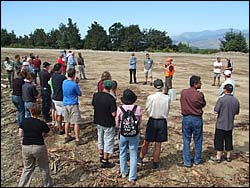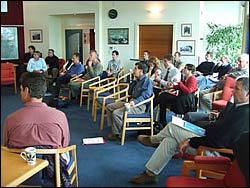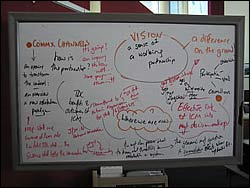Stakeholder issues
Research Status: Past |
ICM AGM 2005 - Spooners saddle |
Introduction
Key stakeholders with interests in the Motueka River catchment were surveyed in January-February 2000, to prioritise research issues relevant to natural resources management in the catchment.
The project was commissioned by the Tasman District Council, as an integral part of activities associated with the development of a research programme funded by the Foundation for Research, Science, & Technology, entitled "Integrated management of land and water resources in complex catchments" - eventually to become known as the Motueka ICM programme.
The principal research partners in this programme are Landcare Research, the Cawthron Institute, and the Tasman District Council.
Research Approach
The project evolved from informal discussions with stakeholders held in January 2000. It became clear during these discussions that dialogue about and prioritisation of the key research issues would be difficult given the format of these meetings (i.e., short time frame and open to all parties). The stakeholders suggested that they would prefer to see a listing of key research issues and have an opportunity to prioritise these issues, privately.
A survey questionnaire was therefore formulated and mailed to 80 interested stakeholders in late January. This questionnaire organised 37 questions into seven research issues and asked stakeholders to rate the questions as of high importance, potential interest, or of no interest to themselves.
Sixty-nine useful responses were received. Landcare research staff experienced in social surveys analysed the results. This was done in three ways: (1) the results were summarised and the frequency of replies presented as percentages in each of the three "importance"categories; (2) natural groupings of questions were analysed using statistical analyses ; and (3) responses were associated with "interest groups" to clarify the different priorities of the stakeholders.
Additional written comments and suggestions were summarised but analysed quantitatively. Respondentsí anonymity was preserved throughout.
Research Results
Most people thought most of the questions were of some importance, with 16 of the 37 questions considered to be of high importance. The following research issues were regarded as most important for resource management in the Motueka River catchment:
Water - availability (86%)
Water - pumping (79%)
Community - competing demands (73%)
Land - gravel (68%)
Water - impacts (65%)
Water - economics (62%)
Land use - ecology (62%).
Of least importance to the majority of respondents were community and applied research issues, in particular iwi and traditional wisdom concerns and coastal sediment issues (although these were important to the three respondents with iwi and marine industry interests).
 |
 |
ICM AGM 2006 - Gravel workshop |
Whiteboard notes |
Recent Publications
Recent Presentations
BMPs, BEPs and Guidelines
| Title | Description |
| The Tool Kit: A planning tool for community consultation and quality decision making in local authorities |
From document: The tool kit guides Local Government managers and elected representatives throu...More » |
| Cultural Planning Guidelines for Local Government |
From guide: These Guidelines have been prepared to assist in integrating cultural strategies m...More » |
| Good Practice Participate: One–off consultation | A guide identifying the steps in a formal consultation exercise between individuals, community group...More » |
| Sustainable Options: Care groups |
A guide to organizing a local land care group. One in a series of land management guidelines: ...More » |
| Effective Participation in Resource Consent Processes: A guide for Tangata Whenua |
From website: This guide aims to help tangata whenua to participate effectively in resource co...More » |
| Drinking–water standards for New Zealand |
From website: The Drinking–water Standards for New Zealand 2005 contains comprehensive i...More » |
| The Guidelines for Drinking–water Quality Management for New Zealand | They are to be read as a complement to the DWSNZ 2005 (http://www.moh.govt.nz/moh.nsf/0/12F2D7FFADC9...More » |
| Dairying and the Environment: Farm Management Issues |
From manual: The purpose of this manual is to provide guidelines to dairy farmers and their ad...More » |
| Shelter for Hill Country Farms: Part 2 shelterbelt trees |
From Booklet: Once you have decided where a shelterbelt will be planted see Environment Topic ...More » |
| Farm Dairy Effluent: Best practice guidelines |
From website: To help dairy farmers manage farm dairy effluent, the Farm Dairy Effluent bookle...More » |
Primary Contacts:

|
Andrew Fenemor
Email Phone: 03 545 7710 More details» |
Institute Landcare Research |
Expertise ICM programme management; local liaison; resource management; hydrology and water resource management |